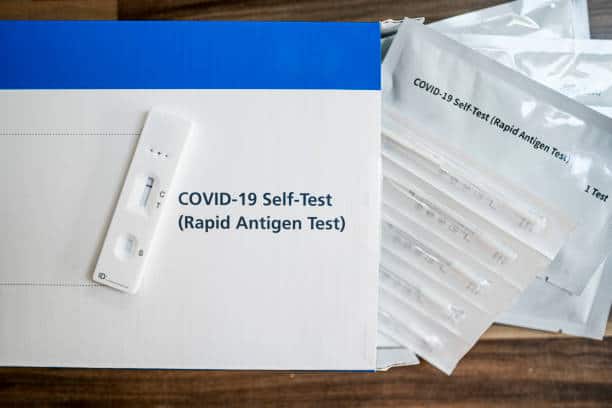Fran Swanson is a student at Harvard Law School.
The continued shortage of rapid antigen tests and PCR test appointments is hitting people who cannot work remotely especially hard, NPR-affiliate KQED reports. Many are put in an impossible situation: find a test or give up a paycheck you can’t afford to miss. And, like every other aspect of this pandemic, the racial and economic inequities are stark. In the Bay Area, tech companies sent boxes of rapid antigen tests to employees who can work from home. But for people like Alejandra Felix, who works as a housekeeper, testing requires driving around for hours without finding a test or appointment and losing a week’s pay because of the delay. She’s also worried about the health of the seven other people in her home, including a grandson who’s too young to be vaccinated. In the Bay Area, small neighborhood clinics have helped fill in the gaps but are struggling because California’s Medicaid program doesn’t reimburse these smaller programs at the same rate as large testing centers.
The Fast Recovery Act, which failed by three votes in the California Assembly last June, will likely be reintroduced this year, the San Francisco Chronicle reports. The bill’s author, Lorena Gonzalez, left the Assembly to lead the California Labor Federation, but it continues to championed by progressive in the Assembly and labor organizations like the SEIU. As Ben wrote last year after the bill’s introduction, it’s a form of sectoral regulation—not bargaining—that can help raise employment standards across the fast food industry, which is otherwise difficult to do because the heavily-franchised industry is so fissured. Imelda Arroyo, a McDonald’s worker who organized two-week walkouts for safer conditions, says that the bill will help secure better conditions, wages, and benefits, in addition to providing “a place where we can explain our concerns.” A new report led by the UCLA Labor Center highlights these concerns and shows the impact of issues like COVID risks, wage theft, and harassment in fast food restaurants in Los Angeles.
Student workers at Dartmouth are seeking voluntary recognition by the college, Valley News reports. Reyna Santoyo, a junior who works in a campus café, said that COVID protocols like masking and plexiglass barriers weren’t always followed, leaving her to feel “like you’re not cared for at all by the college.” Sophomore Alejandro Morales, who works nearly twenty hours a week as a dining manager, said that many of the student workers are first-generation college students who use money from their part-time jobs to help cover living expenses. Student workers won hazard pay earlier this month, but don’t know how long they’ll have it for.
Finally, the January/February 2022 issue of Mother Jones asks, “What the Hell Happened to Work During the Pandemic?” and answers that question with a series of stories from workers. One Instacart shopper reflects on how the company’s opaque algorithm creates tremendous stress and financial uncertainty for workers. A former Comcast/Xfinity salesperson explains how the company’s sales policies incentivized selling people internet packages they couldn’t afford—but were desperate to get so that their children could attend remote school—and why that drove him to quit. A former Amazon staffer shares how he was forced to choose between unpaid family leave and quitting his job when his wife was dying from brain cancer, before being fired for poor performance weeks before she began hospice. An ICU nurse writes that she’s looking forward to the day when she can just worry about her patients again, not her for-profit hospital’s understaffing and inadequate training.






Daily News & Commentary
Start your day with our roundup of the latest labor developments. See all
February 12
Teamsters sue UPS over buyout program; flight attendants and pilots call for leadership change at American Airlines; and Argentina considers major labor reforms despite forceful opposition.
February 11
Hollywood begins negotiations for a new labor agreement with writers and actors; the EEOC launches an investigation into Nike’s DEI programs and potential discrimination against white workers; and Mayor Mamdani circulates a memo regarding the city’s Economic Development Corporation.
February 10
San Francisco teachers walk out; NLRB reverses course on SpaceX; NYC nurses secure tentative agreements.
February 9
FTC argues DEI is anticompetitive collusion, Supreme Court may decide scope of exception to forced arbitration, NJ pauses ABC test rule.
February 8
The Second Circuit rejects a constitutional challenge to the NLRB, pharmacy and lab technicians join a California healthcare strike, and the EEOC defends a single better-paid worker standard in Equal Pay Act suits.
February 6
The California Supreme Court rules on an arbitration agreement, Trump administration announces new rule on civil service protections, and states modify affirmative action requirements